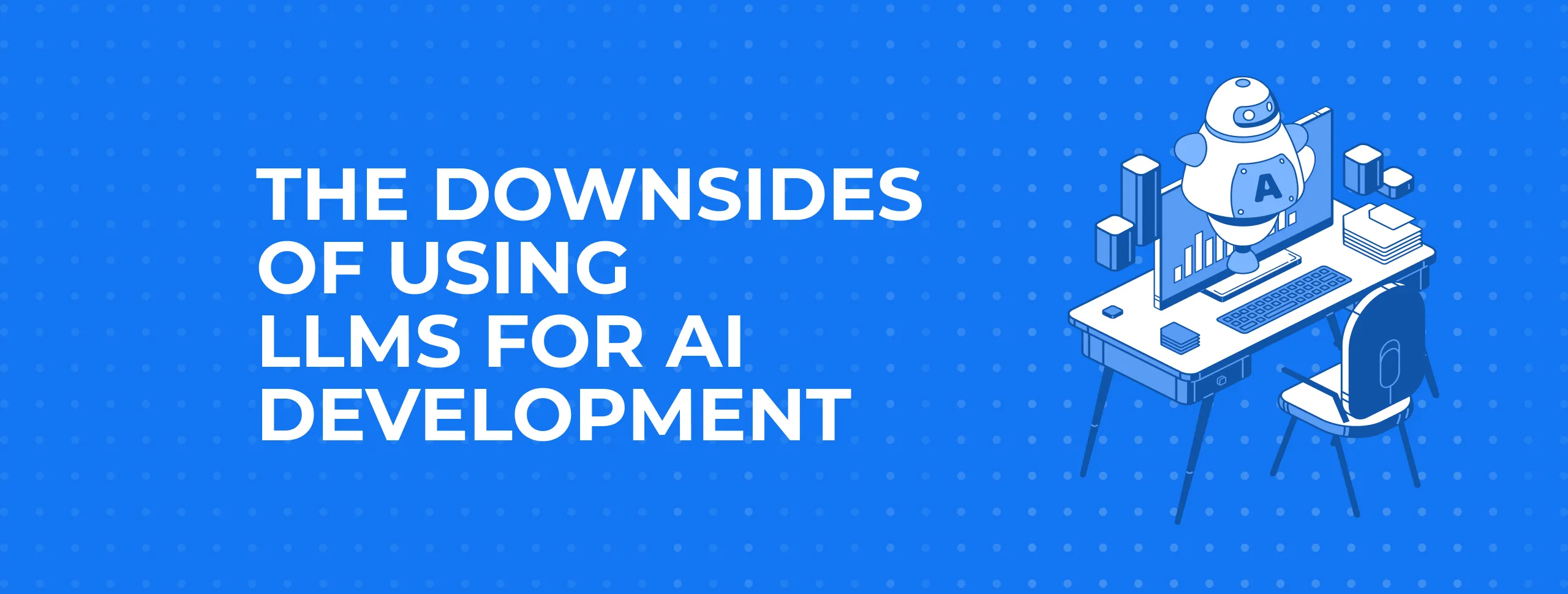
The Downsides of Using LLMs for AI Development and How to Overcome Them

Table of contents
- The Challenges of Utilising LLMs for AI Solutions
- Mitigating the Downsides with a Reliable Partner
- The Bottom Line
As large language models (LLMs) like GPT-4 become more sophisticated, businesses are rethinking their strategies for how to use them for development in AI. These models are capable of processing enormous amounts of data, producing human-like language that powers everything from automated customer support to advanced content creation. Their versatility makes them a go-to choice for businesses looking to streamline operations and improve user interactions.
However, while LLMs offer immense potential, they also come with great challenges that can’t be overlooked. For all their power, these models present issues that could impact cost, data security, and accuracy – areas businesses must be prepared to address.
The Challenges of Utilising LLMs for AI Solutions
.webp)
Data Processing Concerns
One common challenge for businesses just starting with LLMs and GenAI tools for AI development is deciding between a cloud-based or a local LLM. This decision largely depends on whether the data can be processed publicly. When sensitive information is involved, companies may have to sacrifice the advantages of cloud solutions for local models.
Unfortunately, this choice can restrict scalability and flexibility. As a result, the implementation process may become more complex, leading to higher operational costs.
High Computational and Financial Costs
LLMs need significant computational power to train and deploy. Training a model like Mistral involves using thousands of GPUs for weeks or even months, which consumes a massive amount of energy. Even after the initial training, the ongoing costs of running and scaling these models can be quite high. Furthermore, businesses must consider the costs associated with AI model integration, which often demands specialised expertise and resources.
For businesses, especially smaller ones, managing the infrastructure needed for LLM-based solutions can be a significant financial burden. Additionally, the high energy consumption raises environmental concerns, making these models costly and unsustainable without the proper resources.
Data Privacy Risks
LLM models are trained on massive datasets collected from various sources on the web, which may include sensitive information. For example, in the legal industry, using LLMs raises concerns about handling confidential data, which is especially critical when managing client-sensitive information. While these models aim to avoid reproducing specific user data, the sheer volume of information they handle poses potential privacy risks, especially in GenAI use cases where sensitive data is involved.
Unauthorised data leaks or breaches can happen, putting companies at risk of legal challenges and even reputational damage. This is especially critical in highly regulated industries like finance and healthcare, where data privacy is really essential.
Limited Understanding and Context
Despite their sophistication, LLMs are not perfect. They may generate responses that sound accurate but are factually incorrect. This happens because LLMs do not truly "understand" the content. They predict words based on patterns seen in their training data.
As a result, relying on LLMs can lead to errors or misinterpretations. This is especially so when handling complex or technical subjects. It’s a limitation that presents a challenge for businesses that need precise outputs from their AI systems.
Lack of Customisation and Flexibility
While LLMs, including the ChatGPT API, do very well with general-purpose tasks, they can struggle with domain-specific requirements. Customising an LLM to fit the unique needs of a business often requires extensive retraining or fine-tuning. For instance, companies may need to fine-tune ChatGPT to align its responses with their specific industry language, style, and tone. This adds to both cost and complexity.
For companies operating in specialised industries, like healthcare, this lack of flexibility can become a barrier. It can force them to invest even more time and resources to make the model work for their specific use cases.
Mitigating the Downsides with a Reliable Partner
While these downsides are significant, they can be managed with the right approach. Partnering with a reliable AI development company can help businesses work through the complexities of using LLMs effectively.
Firstly, a knowledgeable team of developers and product owners can customise LLM solutions to meet a business's exact needs. A thorough Discovery Phase, characterised by comprehensive analysis, preparation of the project scope, compliance research, and risk mitigation, ensures that this approach saves time and reduces costs by minimising the need to experiment with various options.
The right partner also brings expertise in optimising AI model training and deployment, ensuring that resources are used correctly. This includes using effective strategies for fine-tuning AI models to maximise their utility for specific applications. Finally, they can implement robust data management practices to avoid privacy risks. This ensures compliance with regulations in sensitive industries.
The Bottom Line
In summary, large language models can significantly enhance business operations in 2024. However, they also present challenges that must be addressed to prevent overspending and misalignment with business needs. The field of AI in the UK is evolving fast, marked by increased investment in AI technologies and a growing emphasis on ethical AI practices.
By understanding these trends, businesses can align their strategies with market demands and implement AI effectively. Partnering with a skilled AI solutions provider can help companies navigate these challenges, unlocking innovative solutions that ensure secure data handling and improve customer experiences.





